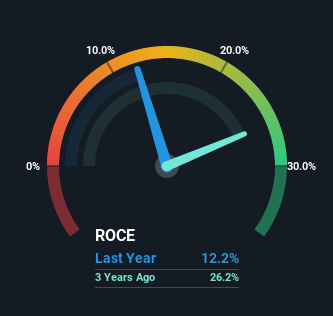- United Kingdom
- /
- Food
- /
- AIM:HOTC
Investors Could Be Concerned With Hotel Chocolat Group's (LON:HOTC) Returns On Capital
If you're not sure where to start when looking for the next multi-bagger, there are a few key trends you should keep an eye out for. Firstly, we'll want to see a proven return on capital employed (ROCE) that is increasing, and secondly, an expanding base of capital employed. If you see this, it typically means it's a company with a great business model and plenty of profitable reinvestment opportunities. Having said that, from a first glance at Hotel Chocolat Group (LON:HOTC) we aren't jumping out of our chairs at how returns are trending, but let's have a deeper look.
Return On Capital Employed (ROCE): What Is It?
For those who don't know, ROCE is a measure of a company's yearly pre-tax profit (its return), relative to the capital employed in the business. Analysts use this formula to calculate it for Hotel Chocolat Group:
Return on Capital Employed = Earnings Before Interest and Tax (EBIT) ÷ (Total Assets - Current Liabilities)
0.12 = UK£20m ÷ (UK£238m - UK£75m) (Based on the trailing twelve months to December 2021).
Thus, Hotel Chocolat Group has an ROCE of 12%. That's a relatively normal return on capital, and it's around the 11% generated by the Food industry.
View our latest analysis for Hotel Chocolat Group

Above you can see how the current ROCE for Hotel Chocolat Group compares to its prior returns on capital, but there's only so much you can tell from the past. If you'd like to see what analysts are forecasting going forward, you should check out our free report for Hotel Chocolat Group.
The Trend Of ROCE
In terms of Hotel Chocolat Group's historical ROCE movements, the trend isn't fantastic. To be more specific, ROCE has fallen from 28% over the last five years. Although, given both revenue and the amount of assets employed in the business have increased, it could suggest the company is investing in growth, and the extra capital has led to a short-term reduction in ROCE. And if the increased capital generates additional returns, the business, and thus shareholders, will benefit in the long run.
On a side note, Hotel Chocolat Group has done well to pay down its current liabilities to 31% of total assets. That could partly explain why the ROCE has dropped. Effectively this means their suppliers or short-term creditors are funding less of the business, which reduces some elements of risk. Since the business is basically funding more of its operations with it's own money, you could argue this has made the business less efficient at generating ROCE.
In Conclusion...
Even though returns on capital have fallen in the short term, we find it promising that revenue and capital employed have both increased for Hotel Chocolat Group. These growth trends haven't led to growth returns though, since the stock has fallen 61% over the last five years. As a result, we'd recommend researching this stock further to uncover what other fundamentals of the business can show us.
One more thing to note, we've identified 2 warning signs with Hotel Chocolat Group and understanding these should be part of your investment process.
While Hotel Chocolat Group isn't earning the highest return, check out this free list of companies that are earning high returns on equity with solid balance sheets.
Valuation is complex, but we're here to simplify it.
Discover if Hotel Chocolat Group might be undervalued or overvalued with our detailed analysis, featuring fair value estimates, potential risks, dividends, insider trades, and its financial condition.
Access Free AnalysisHave feedback on this article? Concerned about the content? Get in touch with us directly. Alternatively, email editorial-team (at) simplywallst.com.
This article by Simply Wall St is general in nature. We provide commentary based on historical data and analyst forecasts only using an unbiased methodology and our articles are not intended to be financial advice. It does not constitute a recommendation to buy or sell any stock, and does not take account of your objectives, or your financial situation. We aim to bring you long-term focused analysis driven by fundamental data. Note that our analysis may not factor in the latest price-sensitive company announcements or qualitative material. Simply Wall St has no position in any stocks mentioned.
About AIM:HOTC
Hotel Chocolat Group
Hotel Chocolat Group plc engages in the manufacture and retail chocolates and cocoa-related products under the Hotel Chocolat brand name in the United Kingdom, rest of Europe, Saint Lucia, the United States, and Japan.
Flawless balance sheet with reasonable growth potential.
Market Insights
Community Narratives



